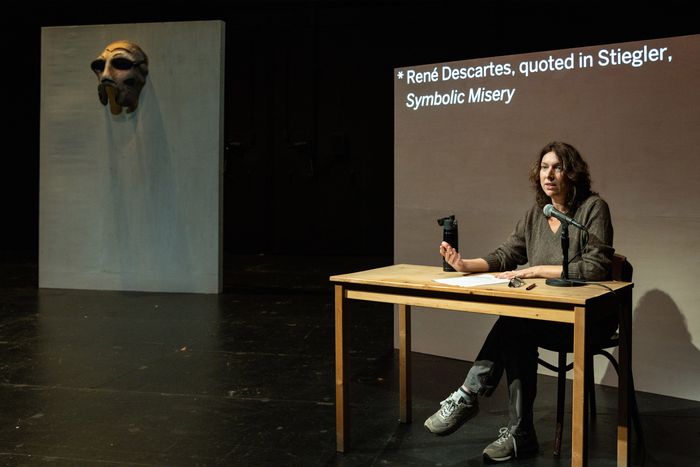
Not to overdo it with the ancient Greekiness, but Prometheus Firebringer is a Pandora’s box: a compact container that might contain the end of the world. The “hybrid lecture performance” by director and writer Annie Dorsen, who is also the only living performer onstage, is less than an hour long, but the subject it’s grappling with could fill — has filled — books, not to mention innumerable think pieces, podcasts, dissertations, op-eds, Reddit threads, speculative dystopian epics, and tweets. That subject is AI, and the Greeks would just love the irony: that the monster with infinite tentacles that gorges itself on information, assuming an ever more human form as it feeds, should, in the very furor around its existence, inspire human beings to generate so much new content, so much fresh food for itself. Look, I’m doing it now!
In its ability to make us pause and face the monster head-on, Prometheus Firebringer is a quietly stunning, brain-jangling piece of work. Dense and yet lucid, somehow both harrowing and playful, the play-lecture takes us along on a series of looping interrogations into how the omnipresence of AI is already rewiring our brains. It’s the last piece in a trilogy of performances that Dorsen describes as “algorithmic theater,” using and examining new technologies while pondering how they’re altering our cultural genome. Dorsen has been at work on this project for more than a decade, but in a recent piece in American Theater, she hardly seemed comfortable with it. “I’m ambivalent about having used these tools, even to criticize them,” she wrote. “I doubt I’ll do it again.”
Ambivalence isn’t easy for the soul, but oh, how good it is for theater. “The core contradiction of tragedy,” Dorsen tells us, quoting the philosopher Simon Critchley, “is that we both know and we don’t know at one and the same time and are destroyed in the process. How can we both know and not know at the same time?” Perhaps in much the same way that we can speak words, express ideas, that both are and are not ours. This is the play’s great magic trick, and it hits us early on with a jolt: “You will see that I am using other people’s words,” says Dorsen after thanking us for coming. “It all comes from somewhere else. Ah, but I’m not stealing anything. I’m just borrowing this stuff, just like when you borrow a book from the library. Going to the library isn’t a crime, is it?” Dorsen speaks deliberately, with pauses between phrases that feel initially odd, a little stilted, a rhythm to which we must force ourselves to adjust. Then, it dawns on us: With each of Dorsen’s phrases, a footnote is projected onto the wall behind her, and the pauses are to give us a fraction of a moment to process them, along with her speech: “Bernard Stiegler, Symbolic Misery Vol. I: The Hyperindustrial Epoch” … “The Twilight Zone, Episode 145” … “Simon Critchley, Tragedy, The Greeks, and Us” …
Not a sentence that comes out of Dorsen’s mouth — not a phrase, not a word — is unglossed. She has constructed her lecture entirely out of quotations, collaged fragments of everything from academic tomes to tweets. A mere handful of sentences represents a patchwork of sources: The Complete Idiot’s Guide to Literary Theory and Criticism; a transcript of a 1988 meeting of the New Zealand Planning Council; Canadian Geographic, Volume 125.
Dorsen is doing what AI does. She is trawling and amalgamating. She is imitating the imitator. And as she weaves “other people’s words” together into arguments that cohere “so tightly … that each follows on from the others” (that’s Descartes), she raises an ever-expanding fractal of questions of ethics and effort. Can she just cut, paste, and print like this? Should she? Are these ideas hers now? “Who is speaking?” (That’s Gregg Lambert, The Elements of Foucault.) How long must all this have taken her? And what about the bot that can do the exact same thing, on an exponential scale, in milliseconds, without stopping, and without ever citing its sources?
That bot is facing Dorsen from across the stage, lurking inside the objects that make up the mise-en-scène, and in between parts of her lecture, we get a demonstration of its powers. This is the ostensible project of Prometheus Firebringer: to use AI (specifically GPT-35, the model that runs ChatGPT) to generate possible versions of the ancient lost play of the same name. Almost 2,500 years ago, Aeschylus wrote a trilogy about the Titan Prometheus, who defied Zeus and gave human beings the gift of fire — a new technology with infinite potential, both generative and destructive. Only the first of these plays has survived in a fuller form, and of the play we think marked the trilogy’s conclusion, we have just the title and a shred of a single sentence. We don’t know how the story ends. So Dorsen has asked GPT-35 for a grand finale.
Even before the show begins, as the audience enters the space, there is a ribbon of text repeatedly typing and wiping itself out on a large screen above the stage. Each time, it starts with the same words: “The play begins with …” Again and again, it presents us with different possible synopses for the lost work. (Some end in celebration, some in massacre.) Below the screen, five grotesque masks stand mounted on poles, and one — larger, more ominous — hangs suspended on a central wall. Sometimes, the theater darkens, and these masks speak to us, lights flickering in their empty eye sockets, uncanny auto-tuned voices rising from speakers hidden inside. Murky, atonal music swells into collections of chords that resembles human moans.
All of this — the text on the screen, the music, the masks, their voices, what they say — has been generated using AI. Or rather, is being generated, in the moment, over and over again. I had to confirm this with the production’s press team, because my little humanist brain wasn’t quite prepared to believe it: The masks — which represent Prometheus and a Greek chorus of human orphans — don’t say the same thing every night. We’re not listening to pre-recorded sound cues, or watching pre-programmed text play out on that screen. We are listening to GPT-35, generating and performing a brand new version of Prometheus Firebringer, in real time, at every show.
Whenever the masks begin to speak, Dorsen turns and listens. Like us, she is hearing something she’s never heard before. Like us, she becomes a curious audience member, capable of surprise, anxiety, boredom. And a big part of the gutsiness of Prometheus Firebringer is that all three of these things are crucial to experiencing the work. At first, the masks are mesmerizing. They have a bizarre ugly-beauty to them, and the amalgam of Ian Douglas-Moore’s eerie sound design, lighting designer Ruth Waldeyer’s ghostly illuminations, and the flickering imagery provided by video designer Ryan Holsopple creates a haunting, solemn sensation, an atmosphere of tragic ritual. Then, of course, one starts to become afraid. What have we done? And even more pressingly, what shall we do?
Simon Critchley argues that that second question sits at the heart of every Greek tragedy. And while the circumstances Dorsen presents in Prometheus Firebringer might make its weight seem crushing, she doesn’t leave it unanswered. Here — sneakily, playfully, like a kid planting a whoopee cushion on a humorless teacher’s chair — is where the boredom comes in. Because as the masks keep talking, something weirdly wonderful happens: You get bored. They start to repeat themselves. They rhyme “sky” with “try” one too many times. They say things that feel chilling — “the arrogance of man will be its undoing” — until you realize how cliché they are, how many thousands of sources they could have been pulled from. At one point, both Dorsen and the audience snorted with laughter when the AI-generated text appearing on the screen informed us earnestly that “with great power comes great responsibility.”
Prometheus Firebringer reveals the truth about AI, which is that, at least at this point, half its name is still inaccurate: It’s wildly powerful, but not actually intelligent. It’s like a sinister Katamari Damacy: a cute little alien who just keeps rolling his ball, collecting War and Peace and Donald Trump’s latest tweets and “Purple Haze” and Mein Kampf and 34 TikTok Recipes That Are Totally Worth the Hype and Hamlet and Heidegger and The Real Housewives and Horton Hears a Who! — and all of these things have the same value, and none of them teaches the monster how to do more than, in the words of Dan McQuillan, “produce grammatical, mostly contextual, and sometimes creative seeming texts that are doing what they’re meant to do, which is the plausible.”
Meanwhile, there sits Dorsen, doing exactly what the AI is doing, and how much more fascinating, impressive, idiosyncratic, and moving she is. I do not know that GPT-35 and its progeny of evils will not destroy the world. But I do know — well, I believe — that there are things beyond destruction, and that, in their name, we have an ethical obligation to the implausible and, the gods be thanked, a gift for it. Dorsen’s brief and brilliantly constructed theatrical essay is a bracing reminder that processing power isn’t imagination, nor is it discernment, effort, humor, or care. Perhaps even these things won’t save us, but they may at least keep us awake to the fact that something else is still, and always, possible.
Prometheus Firebringer is at Polonsky Shakespeare Center through October 1.





